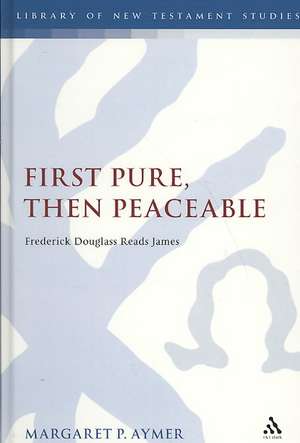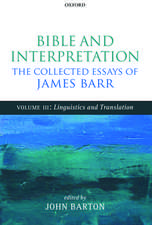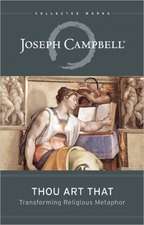First Pure, Then Peaceable: Frederick Douglass Reads James: The Library of New Testament Studies
Autor Dr. Margaret Aymeren Limba Engleză Hardback – 5 mar 2008
In 2001, Continuum published the extensive collected papers from African Americans and the Bible, an interdisciplinary conference held at Union Theological Seminary, NYC. In the collection's introduction, Vincent L. Wimbush issued a challenge to take seriously those who "read darkness," and to consider what it is they are doing when they read the Bible as "scripture." Wimbush's focus on "darkness readers," both within and outside of the African diaspora, breaks open the discourse around the nature, meaning, and importance of the Bible. By following the lead of "darkness readers," the Bible is revealed to be more than a collection of ancient documents from an inaccessible past; it is the site upon which modern, contemporary ideological battles have and continue to be waged.
In this book Margaret Aymer takes up his challenge. It is an examination of the way in which Frederick Douglass, the nineteenth-century abolitionist, used the epistle of James, particularly Jas 3:17, in his abolitionist speeches, to "read" the "darkness" of slavery and slaveholding Christianity. Within the epistle of James is a rhetoric of the world as "darkness". Douglass uses this to read his contemporary "darkness." As part of her research, Aymer has created an index of biblical references in all of Frederick Douglass' abolitionist speeches as collected by J. W. Blassingame (1841-1860).
In this book Margaret Aymer takes up his challenge. It is an examination of the way in which Frederick Douglass, the nineteenth-century abolitionist, used the epistle of James, particularly Jas 3:17, in his abolitionist speeches, to "read" the "darkness" of slavery and slaveholding Christianity. Within the epistle of James is a rhetoric of the world as "darkness". Douglass uses this to read his contemporary "darkness." As part of her research, Aymer has created an index of biblical references in all of Frederick Douglass' abolitionist speeches as collected by J. W. Blassingame (1841-1860).
Din seria The Library of New Testament Studies
- 34%
 Preț: 509.52 lei
Preț: 509.52 lei - 22%
 Preț: 832.58 lei
Preț: 832.58 lei - 22%
 Preț: 832.09 lei
Preț: 832.09 lei - 24%
 Preț: 190.33 lei
Preț: 190.33 lei - 22%
 Preț: 832.65 lei
Preț: 832.65 lei - 23%
 Preț: 191.31 lei
Preț: 191.31 lei -
 Preț: 221.70 lei
Preț: 221.70 lei -
 Preț: 98.92 lei
Preț: 98.92 lei - 31%
 Preț: 830.87 lei
Preț: 830.87 lei - 22%
 Preț: 834.60 lei
Preț: 834.60 lei - 22%
 Preț: 831.59 lei
Preț: 831.59 lei - 30%
 Preț: 717.05 lei
Preț: 717.05 lei - 22%
 Preț: 835.03 lei
Preț: 835.03 lei - 30%
 Preț: 511.40 lei
Preț: 511.40 lei - 24%
 Preț: 190.33 lei
Preț: 190.33 lei -
 Preț: 158.77 lei
Preț: 158.77 lei - 30%
 Preț: 510.04 lei
Preț: 510.04 lei - 22%
 Preț: 832.99 lei
Preț: 832.99 lei - 30%
 Preț: 509.52 lei
Preț: 509.52 lei - 22%
 Preț: 832.80 lei
Preț: 832.80 lei - 22%
 Preț: 831.76 lei
Preț: 831.76 lei - 22%
 Preț: 834.93 lei
Preț: 834.93 lei - 22%
 Preț: 831.59 lei
Preț: 831.59 lei - 22%
 Preț: 832.41 lei
Preț: 832.41 lei - 22%
 Preț: 832.99 lei
Preț: 832.99 lei -
 Preț: 414.71 lei
Preț: 414.71 lei - 30%
 Preț: 773.65 lei
Preț: 773.65 lei - 22%
 Preț: 834.93 lei
Preț: 834.93 lei - 14%
 Preț: 511.81 lei
Preț: 511.81 lei -
 Preț: 222.16 lei
Preț: 222.16 lei - 30%
 Preț: 775.67 lei
Preț: 775.67 lei - 30%
 Preț: 1012.49 lei
Preț: 1012.49 lei - 30%
 Preț: 509.02 lei
Preț: 509.02 lei - 30%
 Preț: 656.90 lei
Preț: 656.90 lei -
 Preț: 469.92 lei
Preț: 469.92 lei -
 Preț: 471.68 lei
Preț: 471.68 lei -
 Preț: 173.21 lei
Preț: 173.21 lei - 30%
 Preț: 833.64 lei
Preț: 833.64 lei - 22%
 Preț: 834.93 lei
Preț: 834.93 lei - 31%
 Preț: 772.17 lei
Preț: 772.17 lei - 30%
 Preț: 774.20 lei
Preț: 774.20 lei - 14%
 Preț: 1124.92 lei
Preț: 1124.92 lei - 22%
 Preț: 948.51 lei
Preț: 948.51 lei - 14%
 Preț: 1128.84 lei
Preț: 1128.84 lei - 31%
 Preț: 1065.91 lei
Preț: 1065.91 lei - 22%
 Preț: 777.71 lei
Preț: 777.71 lei - 31%
 Preț: 1064.84 lei
Preț: 1064.84 lei - 22%
 Preț: 1063.44 lei
Preț: 1063.44 lei - 22%
 Preț: 889.49 lei
Preț: 889.49 lei - 22%
 Preț: 1006.06 lei
Preț: 1006.06 lei
Preț: 947.11 lei
Preț vechi: 1101.29 lei
-14% Nou
Puncte Express: 1421
Preț estimativ în valută:
181.23€ • 189.70$ • 150.84£
181.23€ • 189.70$ • 150.84£
Carte tipărită la comandă
Livrare economică 31 martie-14 aprilie
Preluare comenzi: 021 569.72.76
Specificații
ISBN-13: 9780567033079
ISBN-10: 0567033074
Pagini: 164
Dimensiuni: 156 x 234 x 19 mm
Greutate: 0.41 kg
Editura: Bloomsbury Publishing
Colecția T&T Clark
Seria The Library of New Testament Studies
Locul publicării:London, United Kingdom
ISBN-10: 0567033074
Pagini: 164
Dimensiuni: 156 x 234 x 19 mm
Greutate: 0.41 kg
Editura: Bloomsbury Publishing
Colecția T&T Clark
Seria The Library of New Testament Studies
Locul publicării:London, United Kingdom
Caracteristici
Will provide an unique index of biblical references in all of Frederick Douglassâ?T abolitionist speeches as collected by J. W. Blassingam.
Cuprins
Acknowledgements
1. Introduction: Silence, Darkness and an Invitation to Read
- Biblical Studies: An Ongoing Critique
- African Americans in the Guild of Biblical Studies
- Cultural Interpretation: A Review and Critique
- Reading "Darkness": A Theoretical Model of Marronage
- To Read "Darkness": Frederick Douglass as exemplum
- Frederick Douglass as "Darkness Reader"
- Oratory and Orientation
- Distillations and Large Sketches
2. Redefining "Religion": Douglass' Abolitionist Speeches and James 3:17
- The Language of Religion
- The Dimensions of "Home": Frederick Douglass and James 3:17
- "American Slavery, American Freedom and the Free Church of Scotland"
- Structural, textual, and ideational aspects
- Rhetoric and signification
- Other Uses of James 3:17 in Douglass' Abolitionist Speeches
- "What to the Slave is the Fourth of July?" and James 3:17
- "John Brown" and James 3:17
- The Language of Formation: Further Considerations
1. Introduction: Silence, Darkness and an Invitation to Read
- Biblical Studies: An Ongoing Critique
- African Americans in the Guild of Biblical Studies
- Cultural Interpretation: A Review and Critique
- Reading "Darkness": A Theoretical Model of Marronage
- To Read "Darkness": Frederick Douglass as exemplum
- Frederick Douglass as "Darkness Reader"
- Oratory and Orientation
- Distillations and Large Sketches
2. Redefining "Religion": Douglass' Abolitionist Speeches and James 3:17
- The Language of Religion
- The Dimensions of "Home": Frederick Douglass and James 3:17
- "American Slavery, American Freedom and the Free Church of Scotland"
- Structural, textual, and ideational aspects
- Rhetoric and signification
- Other Uses of James 3:17 in Douglass' Abolitionist Speeches
- "What to the Slave is the Fourth of July?" and James 3:17
- "John Brown" and James 3:17
- The Language of Formation: Further Considerations
3. "Friendship with the Kosmos is Enmity with God": James as "Darkness Reader"
- Identifying the Darkness: A Consideration of Three Themes
- Re-form[ul]ation and James 3:17
- Establishing the Pericope: Formal and Structural Considerations
- The "Darkness" in James 3:13-18: Reconsidering the Three Themes
- Intertextuality in James
- Intertextuality in James 3:13-18
- Signification and Rhetoric
- Signification, Rhetoric, and James 3:13-18
- James and Darkness: Preliminary Conclusions
4. Taking "An Ell": Reading, Darkness and Resistance
- A "Reading" Lesson
- "Reading" as Resistance
- "Scriptures": The Norms of "America"
- Evangelical Christianity and the Myth of America
- Taking "an Ell": "Reading" and "Darkness"
- Why did Douglass "Read" James?
5. "Reading Darkness" and "Biblical Studies"
- Reading Darkness as "Changing the 'Subject'"
Appendix Bibliography
- A "Reading" Lesson
- "Reading" as Resistance
- "Scriptures": The Norms of "America"
- Evangelical Christianity and the Myth of America
- Taking "an Ell": "Reading" and "Darkness"
- Why did Douglass "Read" James?
5. "Reading Darkness" and "Biblical Studies"
- Reading Darkness as "Changing the 'Subject'"
Appendix Bibliography
Recenzii
Mention -New Testament Abstracts, Vol. 53 No. 1, 2009
Review in International Review of Biblical Studies, vol. 54:2007/08
"This published dissertation is more an exercise in hermenuetics/reading strategy than a study of James, but that does not make it any less interesting."
"Aymer's effective appropriation of Wimbush's approach is a significant contribution" Journal for the Study of the New Testament Booklist 2009
Review in International Review of Biblical Studies, vol. 54:2007/08
"This published dissertation is more an exercise in hermenuetics/reading strategy than a study of James, but that does not make it any less interesting."
"Aymer's effective appropriation of Wimbush's approach is a significant contribution" Journal for the Study of the New Testament Booklist 2009












